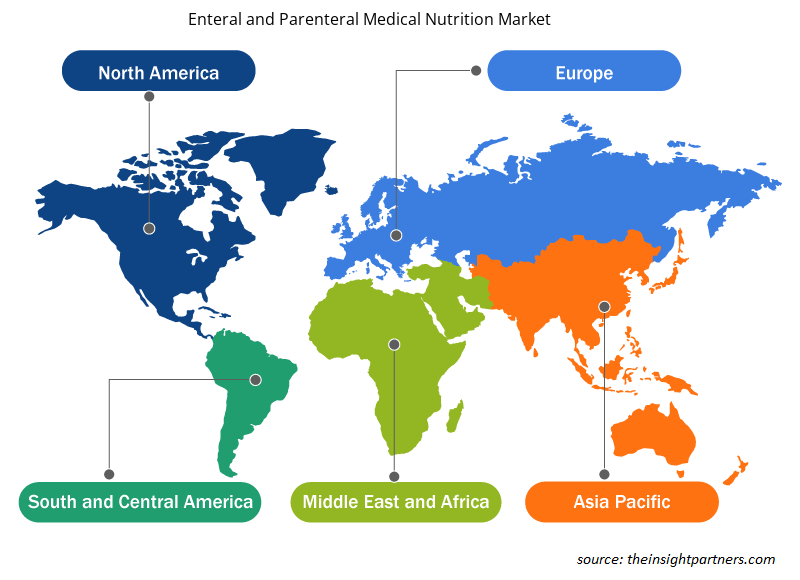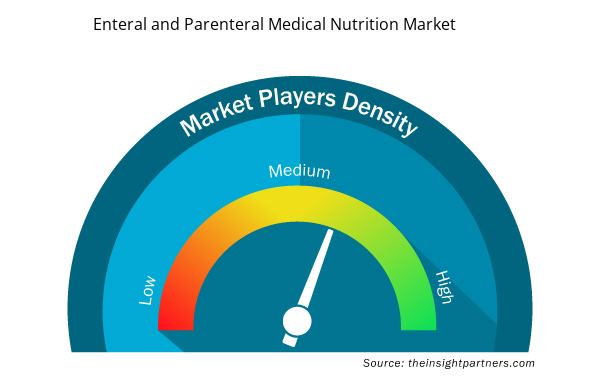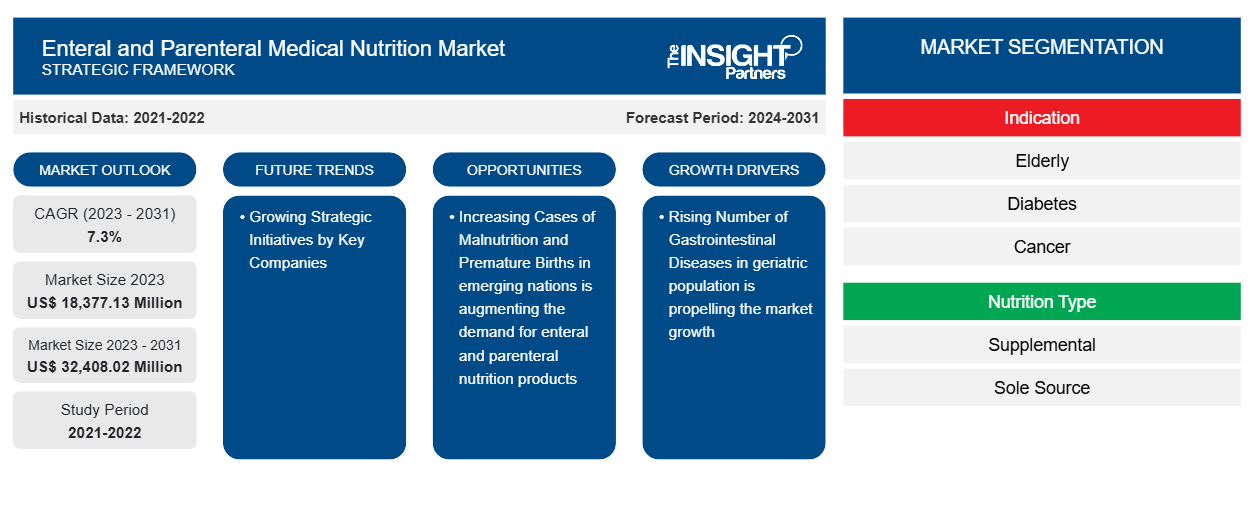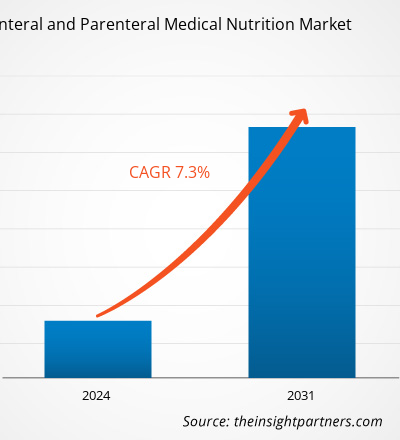肠内和肠外医学营养市场规模预计将从 2023 年的 183.7713 亿美元增至 2031 年的 324.0802 亿美元。预计 2023-2031 年期间市场复合年增长率为 7.3%。特定配方和植物性营养产品很可能成为市场的主要趋势。
肠内和肠外医学营养市场分析
市场的增长主要得益于国际参与者不断增加的投资、中国等国政府支持力度的加强、支持性举措和营养研究以及医疗保健基础设施的进步。肠内和肠外营养的宏观和微量营养素配方及其应用因不同疾病(如癌症和胃肠道疾病)而异。高能量配方(>1 kcal/ml)用于增加胃肠道功能障碍患者的卡路里输送。转向植物性食物的人数增加导致全球对植物性营养产品的需求增加。2020 年 Innova 消费者调查显示,饮食多样性、健康、可持续性和口味是人们考虑植物性替代品的最重要原因。市场上的公司(Kate Farms、Functional Formularies 和 Real Food Blends)预计,对健康食品的日益关注将转变为对更健康营养产品的偏好。因此,公司开发了更多天然和植物性肠内产品。此外,老年人口的增加、慢性病和神经系统疾病发病率的上升以及市场参与者的产品创新预计将支持市场增长。
肠内和肠外医学营养市场概览
根据美国疾病控制与预防中心(CDC)的数据,2020年美国早产占所有新生儿的10%,2021年达到10.5%,同比增长4%。根据联合国国际儿童紧急基金会2022年7月的数据,营养不良发生率从2019年的8.0%上升到2020年的9.3%,2021年又跃升至9.8%。同样,根据2021年发表的一项题为“医院营养不良多中心调查”的研究,美国医院约33%的患者营养不良或有营养风险,英国约11-45%的住院患者和家庭护理环境中的患者营养不良。因此,儿童和成人营养不良的巨大负担以及大量早产加剧了对肠内和肠外医学营养产品的需求,进而刺激了市场的增长。
定制此报告以满足您的需求
您可以免费定制任何报告,包括本报告的部分内容、国家级分析、Excel 数据包,以及为初创企业和大学提供优惠和折扣
- 获取此报告的关键市场趋势。这个免费样品将包括数据分析,从市场趋势到估计和预测。
肠内和肠外医学营养市场驱动因素和机遇
胃肠道疾病数量增加有利于市场增长
肠梗阻、克罗恩病、溃疡性结肠炎、短肠综合征 (SBS) 和某些癌症是胃肠道疾病的一些例子。根据 2021 年 1 月发布的《功能性胃肠道疾病的全球患病率和负担,罗马基金会全球研究结果》,功能性胃肠道疾病已影响全球 40% 以上的人。英国克罗恩病和结肠炎协会进行的研究证实,2022 年,英国每 123 人中约有 1 人患有克罗恩病或溃疡性结肠炎,占英国 IBD 患者人数的约 50 万。此外,每年每 100 万人中约有 3 人患有 SBS。患有胃肠道疾病的患者营养不良的风险增加。他们还可能由于治疗性饮食限制和厌食症或营养需求改变导致的食欲不振而出现营养不良,这可能是疾病本身造成的。因此,建议胃肠道疾病患者进行医学营养,因为这些患者无法摄取食物。肠内和肠外途径是向他们提供必需营养的理想途径。因此,胃肠道疾病病例的增加推动了肠内和肠外医学营养市场的增长。
企业不断增加的战略举措
肠内和肠外医学营养市场中的公司不断关注战略发展,这有助于他们提高销售额、扩大地理覆盖范围并提高满足现有客户群需求的能力。以下是一些值得注意的市场发展:
- 2023 年 1 月,Nutricia 推出了 Fortimel Plant-Based Energy,这是首款植物基即饮口服营养补充剂。该产品专为满足营养不良人群或因疾病而面临营养不良风险的人群的营养需求而设计。通过此次推出,该公司将以达能(母公司)在植物营养方面的能力为基础,扩大其 Fortimel 产品组合。
- 2022 年 3 月,Vygon 收购了位于秘鲁的分销公司 Macatt Medica。Macatt Medica 在秘鲁提供 Vygon 的大部分产品,包括各种肠内营养产品。通过此次收购,Macatt Medica 成为 Vygon 的全资子公司,协助后者在南美开展业务。
因此,针对众多健康问题开发先进产品和战略举措使市场上的公司能够创造新的或更好的产品和新业务,以保持市场竞争力。此类战略增长举措为市场提供了巨大的增长机会。
肠内和肠外医学营养市场报告细分分析
有助于得出肠内和肠外医学营养市场分析的关键部分是适应症、营养类型、形式、产品类型、给药途径、年龄组和分销渠道。
- 根据适应症,肠内和肠外医学营养市场分为老年人、胃肠道疾病、糖尿病、癌症、呼吸系统疾病、肾病、肝功能衰竭、阿尔茨海默病、痴呆症、新冠后等。老年人群体在 2023 年占据了最大的市场份额。预计在预测期内,胃肠道疾病群体的复合年增长率最高。
- 根据营养类型,市场分为补充营养和单一来源营养。补充营养部分在 2023 年占据了更大的市场份额。单一来源营养部分预计在预测期内将实现更高的复合年增长率。
- 根据形式,肠内和肠外医学营养市场分为液体、粉末和半固体。液体部分在 2023 年占据最大的市场份额。预计粉末部分在预测期内将实现最高的复合年增长率。
- 根据产品类型,市场分为一般产品和疾病专用产品。一般产品在 2023 年占据了更大的市场份额,预计在预测期内将实现更高的复合年增长率。
- 根据给药途径,市场分为口服、管饲和肠外给药。肠外给药在 2023 年占据了最大的市场份额。预计口服给药在预测期内的复合年增长率最高。
- 根据年龄组,市场分为 60 岁以上、18-60 岁、3-18 岁和 3 岁以下。60 岁以上的群体在 2023 年占据了最大的市场份额。预计 18-60 岁群体在预测期内的复合年增长率最高。
- 根据分销渠道,市场分为医院药房、电子商务、零售店等。医院药房部门在 2023 年占据了最大的市场份额。预计电子商务部门在预测期内的复合年增长率最高。
肠内和肠外医学营养市场份额按地区分析
肠内和肠外医学营养市场报告的地理范围主要分为五个区域:北美、亚太、欧洲、中东和非洲、南美和中美。
北美一直主导着肠内和肠外医学营养市场。该地区市场的增长归因于慢性病患病率的上升、市场参与者不断增长的战略发展、对肠内和肠外营养的日益偏好,以及人们对医学营养益处的认识的激增。根据一篇题为“肠外营养趋势”的文章,在美国,平均每年约有 34,000 名患者接受肠外营养。肠内管饲可用于治疗 350 多种儿童疾病。此外,美国政府正在采取多项举措来促进肠内和肠外医学营养市场的发展。例如,喂食管意识基金会正在提高人们对采用喂食管及其相关益处的认识。加拿大消化健康基金会表示,数百万加拿大人患有消化系统疾病。每年约有 2000 万加拿大人,即每三个人中就有两个人患有消化系统疾病。
此外,主要市场参与者的存在可能会对未来几年肠内和肠外医学营养市场的增长产生积极影响。2021 年 2 月,美诺医疗集团的 Puggle 肠内喂养泵和儿科和成人患者喂养套件获得了 FDA 510(k) 批准。预计未来几年亚太地区将以最高的复合年增长率增长。
肠内和肠外医学营养市场区域洞察
Insight Partners 的分析师已详细解释了预测期内影响肠内和肠外医疗营养市场的区域趋势和因素。本节还讨论了北美、欧洲、亚太地区、中东和非洲以及南美和中美洲的肠内和肠外医疗营养市场细分和地理位置。

- 获取肠内和肠外医学营养市场的区域具体数据
肠内和肠外医学营养市场报告范围
| 报告属性 | 细节 |
|---|---|
| 2023 年的市场规模 | 183.7713亿美元 |
| 2031 年市场规模 | 324.0802亿美元 |
| 全球复合年增长率(2023 - 2031) | 7.3% |
| 史料 | 2021-2022 |
| 预测期 | 2024-2031 |
| 涵盖的领域 | 按适应症
|
| 覆盖地区和国家 | 北美
|
| 市场领导者和主要公司简介 |
|
肠内和肠外医学营养市场参与者密度:了解其对业务动态的影响
肠内和肠外医学营养市场正在快速增长,这得益于终端用户需求的不断增长,这些需求源于消费者偏好的不断变化、技术进步以及对产品优势的认识不断提高等因素。随着需求的增加,企业正在扩大其产品范围,进行创新以满足消费者的需求,并利用新兴趋势,从而进一步推动市场增长。
市场参与者密度是指在特定市场或行业内运营的企业或公司的分布情况。它表明在给定市场空间中,相对于其规模或总市场价值,有多少竞争对手(市场参与者)存在。
在肠内和肠外医学营养市场运营的主要公司有:
- 雅培实验室
- 雀巢公司
- 纽迪希亚国际有限公司
- 美德瑞森公司
- 费森尤斯卡比公司
- B. Braun SE
免责声明:上面列出的公司没有按照任何特定顺序排列。

- 了解肠内和肠外医学营养市场顶级关键参与者概况
肠内和肠外医学营养市场新闻和最新发展
肠内和肠外医学营养市场通过收集后续和后续研究的定性和定量数据进行评估,其中包括重要的公司出版物、协会数据和数据库。以下列出了肠内和肠外医学营养市场的一些发展情况:
- 费森尤斯卡比的 SMOFlipid 脂质注射乳剂获得美国食品药品监督管理局 (FDA) 批准。该乳剂用于为儿科患者(包括足月新生儿和早产新生儿)提供肠外营养,这使其成为首个也是唯一一个适用于各年龄段肠外营养患者的四油脂质乳剂。(来源:费森尤斯卡比,新闻稿,2022 年 3 月)
- 雅培推出了 Similac 360 Total Care,这是该公司新一代含有母乳低聚糖 (HMO) 的婴儿配方奶粉。这是美国第一款也是唯一一款混合了五种不同益生元 HMO(仅在母乳中同时存在)的婴儿配方奶粉。Similac 360 Total Care 旨在提供营养,以支持婴儿的整体健康和成长,包括免疫系统、消化系统和大脑的发育。(来源:雅培,新闻稿,2021 年 11 月)
肠内和肠外医学营养市场报告范围和交付成果
“肠内和肠外医学营养市场规模和预测(2021-2031 年)”报告对以下领域进行了详细的市场分析:
- 肠内和肠外医学营养市场规模以及全球、区域和国家层面所有主要细分市场的预测
- 肠内和肠外医学营养市场趋势以及市场动态,如驱动因素、限制因素和关键机遇
- 详细的 PEST 和 SWOT 分析
- 肠内和肠外医学营养市场分析涵盖主要市场趋势、全球和区域框架、主要参与者、法规和最新市场发展
- 行业格局和竞争分析,涵盖市场集中度、热图分析、知名参与者以及肠内和肠外医疗营养市场的最新发展
- 详细的公司简介
- 历史分析(2 年)、基准年、预测(7 年)及复合年增长率
- PEST 和 SWOT 分析
- 市场规模价值/数量 - 全球、区域、国家
- 行业和竞争格局
- Excel 数据集


- Quantitative Structure-Activity Relationship (QSAR) Market
- High Speed Cable Market
- Identity Verification Market
- Procedure Trays Market
- Aesthetic Medical Devices Market
- Micro-Surgical Robot Market
- Bio-Based Ethylene Market
- Cell Line Development Market
- Vessel Monitoring System Market
- Hydrolyzed Collagen Market

Report Coverage
Revenue forecast, Company Analysis, Industry landscape, Growth factors, and Trends

Segment Covered
This text is related
to segments covered.

Regional Scope
North America, Europe, Asia Pacific, Middle East & Africa, South & Central America

Country Scope
This text is related
to country scope.
常见问题
North America region dominated the enteral and parenteral medical nutrition market in 2023.
The increase in the prevalence of gastrointestinal diseases and growing cases of malnutrition and premature births are the most influential factors responsible for market growth.
Abbott Laboratories, Nestle SA, Nutricia International BV, Medtrition Inc, Fresenius Kabi AG, B. Braun SE, Smartfish AS, Nutrisens SAS, AYMES International Ltd, Medifood International SA, Easy Line Ltd, Charing Cross Scientific AS, Baxter International Inc, and Medica Nutrition Inc. are the market players in the enteral and parenteral medical nutrition market.
The estimated value of the enteral and parenteral medical nutrition market accounted for US$ 32,408.02 million in 2031.
The global enteral and parenteral medical nutrition market is estimated to register a CAGR of 7.3% during the forecast period 2023–2031.
Trends and growth analysis reports related to Life Sciences : READ MORE..
The Insight Partners performs research in 4 major stages: Data Collection & Secondary Research, Primary Research, Data Analysis and Data Triangulation & Final Review.
- Data Collection and Secondary Research:
As a market research and consulting firm operating from a decade, we have published and advised several client across the globe. First step for any study will start with an assessment of currently available data and insights from existing reports. Further, historical and current market information is collected from Investor Presentations, Annual Reports, SEC Filings, etc., and other information related to company’s performance and market positioning are gathered from Paid Databases (Factiva, Hoovers, and Reuters) and various other publications available in public domain.
Several associations trade associates, technical forums, institutes, societies and organization are accessed to gain technical as well as market related insights through their publications such as research papers, blogs and press releases related to the studies are referred to get cues about the market. Further, white papers, journals, magazines, and other news articles published in last 3 years are scrutinized and analyzed to understand the current market trends.
- Primary Research:
The primarily interview analysis comprise of data obtained from industry participants interview and answers to survey questions gathered by in-house primary team.
For primary research, interviews are conducted with industry experts/CEOs/Marketing Managers/VPs/Subject Matter Experts from both demand and supply side to get a 360-degree view of the market. The primary team conducts several interviews based on the complexity of the markets to understand the various market trends and dynamics which makes research more credible and precise.
A typical research interview fulfils the following functions:
- Provides first-hand information on the market size, market trends, growth trends, competitive landscape, and outlook
- Validates and strengthens in-house secondary research findings
- Develops the analysis team’s expertise and market understanding
Primary research involves email interactions and telephone interviews for each market, category, segment, and sub-segment across geographies. The participants who typically take part in such a process include, but are not limited to:
- Industry participants: VPs, business development managers, market intelligence managers and national sales managers
- Outside experts: Valuation experts, research analysts and key opinion leaders specializing in the electronics and semiconductor industry.
Below is the breakup of our primary respondents by company, designation, and region:

Once we receive the confirmation from primary research sources or primary respondents, we finalize the base year market estimation and forecast the data as per the macroeconomic and microeconomic factors assessed during data collection.
- Data Analysis:
Once data is validated through both secondary as well as primary respondents, we finalize the market estimations by hypothesis formulation and factor analysis at regional and country level.
- Macro-Economic Factor Analysis:
We analyse macroeconomic indicators such the gross domestic product (GDP), increase in the demand for goods and services across industries, technological advancement, regional economic growth, governmental policies, the influence of COVID-19, PEST analysis, and other aspects. This analysis aids in setting benchmarks for various nations/regions and approximating market splits. Additionally, the general trend of the aforementioned components aid in determining the market's development possibilities.
- Country Level Data:
Various factors that are especially aligned to the country are taken into account to determine the market size for a certain area and country, including the presence of vendors, such as headquarters and offices, the country's GDP, demand patterns, and industry growth. To comprehend the market dynamics for the nation, a number of growth variables, inhibitors, application areas, and current market trends are researched. The aforementioned elements aid in determining the country's overall market's growth potential.
- Company Profile:
The “Table of Contents” is formulated by listing and analyzing more than 25 - 30 companies operating in the market ecosystem across geographies. However, we profile only 10 companies as a standard practice in our syndicate reports. These 10 companies comprise leading, emerging, and regional players. Nonetheless, our analysis is not restricted to the 10 listed companies, we also analyze other companies present in the market to develop a holistic view and understand the prevailing trends. The “Company Profiles” section in the report covers key facts, business description, products & services, financial information, SWOT analysis, and key developments. The financial information presented is extracted from the annual reports and official documents of the publicly listed companies. Upon collecting the information for the sections of respective companies, we verify them via various primary sources and then compile the data in respective company profiles. The company level information helps us in deriving the base number as well as in forecasting the market size.
- Developing Base Number:
Aggregation of sales statistics (2020-2022) and macro-economic factor, and other secondary and primary research insights are utilized to arrive at base number and related market shares for 2022. The data gaps are identified in this step and relevant market data is analyzed, collected from paid primary interviews or databases. On finalizing the base year market size, forecasts are developed on the basis of macro-economic, industry and market growth factors and company level analysis.
- Data Triangulation and Final Review:
The market findings and base year market size calculations are validated from supply as well as demand side. Demand side validations are based on macro-economic factor analysis and benchmarks for respective regions and countries. In case of supply side validations, revenues of major companies are estimated (in case not available) based on industry benchmark, approximate number of employees, product portfolio, and primary interviews revenues are gathered. Further revenue from target product/service segment is assessed to avoid overshooting of market statistics. In case of heavy deviations between supply and demand side values, all thes steps are repeated to achieve synchronization.
We follow an iterative model, wherein we share our research findings with Subject Matter Experts (SME’s) and Key Opinion Leaders (KOLs) until consensus view of the market is not formulated – this model negates any drastic deviation in the opinions of experts. Only validated and universally acceptable research findings are quoted in our reports.
We have important check points that we use to validate our research findings – which we call – data triangulation, where we validate the information, we generate from secondary sources with primary interviews and then we re-validate with our internal data bases and Subject matter experts. This comprehensive model enables us to deliver high quality, reliable data in shortest possible time.


 获取此报告的免费样本
获取此报告的免费样本